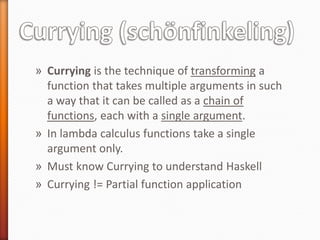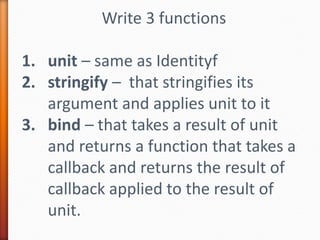Fun with Lambdas: C++14 Style (part 1)
- 1. Sumant Tambe, Ph.D. Microsoft Visual C++ MVP Senior Software Research Engineer Real-Time Innovations, Inc. @sutambe SFBay Association of C/C++ Users March 12, 2014
- 2. Author Blogger Open-Source Contributor LEESA Rx4DDS.NET Reflection for DDS-XTypes
- 3. » Functional Programming eXchange » Strange Loop » ReactConf » LambdaConf » LambdaJam » CraftConf » MSFT MVP Summit » Qcon NYC/SF/London » Closure West » Spring into Scala » Progressive F# » FP Days » SkillsMatter
- 4. » Lambda Expressions ˃ expr.prim.lambda » Anonymous functions void abssort(float* x, unsigned N) { std::sort(x, x + N, [](float a, float b) { return std::abs(a) < std::abs(b); }); }
- 5. class Comp { float a; public: Comp(float x) { a = x; } bool compare(float b) const { return std::abs(a) < std::abs(b); } }; float array[5] = { 0, 1, 2, 3, 4 }; float a = 3; Comp f(a); for(float item : array) std::cout << std::boolalpha << f.compare(item);
- 6. class Comp { float a; public: Comp(float x) { a = x; } bool operator () (float b) const { return std::abs(a) < std::abs(b); } }; float array[5] = { 0, 1, 2, 3, 4 }; float a = 3; Comp f(a); for(float item : array) std::cout << std::boolalpha << f(item);
- 7. class ##### { float a; public: Foo(float x) { a = x; } bool operator () (float b) const { return std::abs(a) < std::abs(b); } }; float array[5] = { 0, 1, 2, 3, 4 }; float a = 3; auto f = #####(a); for(float item : array) std::cout << std::boolalpha << f(item);
- 8. class ##### { float a; public: Foo(float x) { a = x; } bool operator () (float b) const { return std::abs(a) < std::abs(b); } }; float array[5] = { 0, 1, 2, 3, 4 }; float a = 3; auto f = #####(a); auto f = [a](float b) { return std::abs(a) < std::abs(b) }; for(float item : array) std::cout << std::boolalpha << f(item);
- 9. » Anonymous functions » Written exactly in the place where it's needed » Can access the variables available in the enclosing scope (closure) » May maintain state (mutable or const) » Can be passed to a function » Can be returned from a function » Deduce return type automatically » Accept generic parameter types (only in C++14) [a](auto b) { return std::abs(a) < std::abs(b) };
- 10. Thanks to Douglas Crockford. Link to Doug’s JavaScript talk
- 12. Write an Identity function that takes an argument and returns the same argument. Identity(3) //3
- 13. auto Identity = [](auto x) { return x; };
- 14. Write 3 functions add, sub, and mul that take 2 parameters each and return their sum, difference, and product respectively. add(3, 4) // 7 sub(4, 3) // 1 mul(4, 5) // 20
- 15. auto add = [](auto x, auto y) { return x + y; }; auto sub = [](auto x, auto y) { return x - y; }; int mul (int x, int y) { return x * y; };
- 16. Write a function, identityf, that takes an argument and returns a callable that returns that argument auto idf = identityf(5); idf() // 5
- 17. auto identityf = [](auto x) { class Inner { int x; public: Inner(int i): x(i) {} int operator() () { return x; } }; return Inner(x); }; auto idf = identityf(5); idf() // 5
- 18. auto identityf = [](auto x) { return [](){ /* must remember x */ }; };
- 19. auto identityf = [](auto x) { return [=]() { return x; }; }; auto idf = identityf(5); idf() // 5
- 20. » A lambda is just an anonymous function. » A closure is a function which closes over the environment in which it was defined. » Not all closures are lambdas and not all lambdas are closures. » Closures are just function objects in C++ » C++ closures do not extend the lifetime of their context. (If you need this use shared_ptr)
- 21. Write a function that produces a function that returns values in a range fromto(0, 10)
- 22. auto fromto = [](auto start, auto finish) { return }; auto range = fromto(0, 10) range() // 0 range() // 1 [=]() mutable { if(start < finish) return start++; else throw std::runtime_error(“Complete"); };
- 23. Write a function that adds from two invocations addf(5)(4) // 9
- 24. auto addf = [](auto x) { return [=](auto y) { return x+y; }; }; addf(5)(4) // 9
- 25. Write a function swap that swaps the arguments of a binary function swap(sub)(3, 2) // -1
- 26. auto sub = [](auto x, auto y) { return x–y; }; auto swap =[](auto binary) { return [=](auto x, auto y) { return binary(y, x); }; }; swap(sub)(3, 2) // -1
- 27. Write a function twice that takes a binary function and returns a unary function that passes its argument to the binary function twice. twice(add)(11) // 22
- 28. auto twice =[](auto binary) { return [=](auto x) { return binary(x, x); }; }; twice(add)(11) // 22
- 29. Write a function that takes a binary function and makes it callable with two invocations applyf(mul)(3)(4) // 12
- 30. auto applyf = [](auto binary) { return [binary](auto x) { return [binary,x](auto y) { return binary(x, y); }; }; }; auto a = applyf(mul); auto b = a(3); auto c = b(4) // 12
- 31. Write a function that takes a function and an argument and returns a function that takes the second argument and applies the function curry(mul, 3)(4) // 12
- 32. auto curry = [](auto binary, auto x) { return [=](auto y) { return binary(x, y); }; }; curry(mul, 3)(4) // 12
- 33. » Currying is the technique of transforming a function that takes multiple arguments in such a way that it can be called as a chain of functions, each with a single argument. » In lambda calculus functions take a single argument only. » Must know Currying to understand Haskell » Currying != Partial function application
- 34. auto addFour = [](auto a, auto b, auto c, auto d) { return a+b+c+d; }; auto partial = [](auto func, auto a, auto b) { return [=](auto c, auto d) { return func(a, b, c, d); }; }; partial(addFour,1,2)(3,4); //10
- 35. Without creating a new function show 3 ways to create the inc function inc(4) // 5
- 36. auto inc = curry(add, 1); auto inc = addf(1); auto inc = applyf(add)(1); inc(4) // 5
- 37. Write a function composeu that takes two unary functions and returns a unary function that calls them both composeu(inc, curry(mul, 5))(3) // 20
- 38. auto composeu =[](auto f1, auto f2) { return [=](auto x) { return f2(f1(x)); }; }; composeu(inc1, curry(mul, 5))(3) // 20
- 39. Write a function that returns a function that allows a binary function to be called exactly once once(add)(3, 4) // 7 once(add)(3, 4) // error
- 40. auto once = [](auto binary) { bool done = false; return [=](auto x, auto y) mutable { if(!done) { done = true; return binary(x, y); } else throw std::runtime_error("once!"); }; }; once(add)(3, 4) // 7 once(add)(3, 4) // exception
- 41. Write a function that takes a binary function and returns a function that takes two arguments and a callback and invokes the callback on the result of the binary function.
- 42. auto binaryc = [](auto binary) { return [=](auto x, auto y, auto callbk) { return callbk(binary(x,y)); }; }; binaryc(mul)(5, 6, inc) // 31 binaryc(mul)(5,6,[](int a) { return a+1; });
- 43. Write 3 functions 1. unit – same as Identityf 2. stringify – that stringifies its argument and applies unit to it 3. bind – that takes a result of unit and returns a function that takes a callback and returns the result of callback applied to the result of unit.
- 44. auto unit = [](auto x) { return [=]() { return x; }; }; auto stringify = [](auto x) { std::stringstream ss; ss << x; return unit(ss.str()); }; auto bind = [](auto u) { return [=](auto callback) { return callback(u()); }; };
- 45. std::cout << "Left Identity " << stringify(15)() << "==" << bind(unit(15))(stringify)() << std::endl; std::cout << "Right Identity " << stringify(5)() << "==" << bind(stringify(5))(unit)() << std::endl; Verify




 {
return std::abs(a) < std::abs(b);
});
}](https://image.slidesharecdn.com/funwithlambdas-c14style-140313013038-phpapp02/85/Fun-with-Lambdas-C-14-Style-part-1-4-320.jpg)
![class Comp {
float a;
public:
Comp(float x) {
a = x;
}
bool compare(float b) const {
return std::abs(a) < std::abs(b);
}
};
float array[5] = { 0, 1, 2, 3, 4 };
float a = 3;
Comp f(a);
for(float item : array)
std::cout << std::boolalpha << f.compare(item);](https://image.slidesharecdn.com/funwithlambdas-c14style-140313013038-phpapp02/85/Fun-with-Lambdas-C-14-Style-part-1-5-320.jpg)
![class Comp {
float a;
public:
Comp(float x) {
a = x;
}
bool operator () (float b) const {
return std::abs(a) < std::abs(b);
}
};
float array[5] = { 0, 1, 2, 3, 4 };
float a = 3;
Comp f(a);
for(float item : array)
std::cout << std::boolalpha << f(item);](https://image.slidesharecdn.com/funwithlambdas-c14style-140313013038-phpapp02/85/Fun-with-Lambdas-C-14-Style-part-1-6-320.jpg)
![class ##### {
float a;
public:
Foo(float x) {
a = x;
}
bool operator () (float b) const {
return std::abs(a) < std::abs(b);
}
};
float array[5] = { 0, 1, 2, 3, 4 };
float a = 3;
auto f = #####(a);
for(float item : array)
std::cout << std::boolalpha << f(item);](https://image.slidesharecdn.com/funwithlambdas-c14style-140313013038-phpapp02/85/Fun-with-Lambdas-C-14-Style-part-1-7-320.jpg)
![class ##### {
float a;
public:
Foo(float x) {
a = x;
}
bool operator () (float b) const {
return std::abs(a) < std::abs(b);
}
};
float array[5] = { 0, 1, 2, 3, 4 };
float a = 3;
auto f = #####(a);
auto f = [a](float b) { return std::abs(a) < std::abs(b) };
for(float item : array)
std::cout << std::boolalpha << f(item);](https://image.slidesharecdn.com/funwithlambdas-c14style-140313013038-phpapp02/85/Fun-with-Lambdas-C-14-Style-part-1-8-320.jpg)
 { return std::abs(a) < std::abs(b) };](https://image.slidesharecdn.com/funwithlambdas-c14style-140313013038-phpapp02/85/Fun-with-Lambdas-C-14-Style-part-1-9-320.jpg)



 {
return x;
};](https://image.slidesharecdn.com/funwithlambdas-c14style-140313013038-phpapp02/85/Fun-with-Lambdas-C-14-Style-part-1-13-320.jpg)

 {
return x + y;
};
auto sub = [](auto x, auto y) {
return x - y;
};
int mul (int x, int y) {
return x * y;
};](https://image.slidesharecdn.com/funwithlambdas-c14style-140313013038-phpapp02/85/Fun-with-Lambdas-C-14-Style-part-1-15-320.jpg)

 {
class Inner {
int x;
public: Inner(int i): x(i) {}
int operator() () { return x; }
};
return Inner(x);
};
auto idf = identityf(5);
idf() // 5](https://image.slidesharecdn.com/funwithlambdas-c14style-140313013038-phpapp02/85/Fun-with-Lambdas-C-14-Style-part-1-17-320.jpg)
 {
return [](){ /* must remember x */ };
};](https://image.slidesharecdn.com/funwithlambdas-c14style-140313013038-phpapp02/85/Fun-with-Lambdas-C-14-Style-part-1-18-320.jpg)
 {
return [=]() { return x; };
};
auto idf = identityf(5);
idf() // 5](https://image.slidesharecdn.com/funwithlambdas-c14style-140313013038-phpapp02/85/Fun-with-Lambdas-C-14-Style-part-1-19-320.jpg)


 {
return
};
auto range = fromto(0, 10)
range() // 0
range() // 1
[=]() mutable {
if(start < finish)
return start++;
else
throw std::runtime_error(“Complete");
};](https://image.slidesharecdn.com/funwithlambdas-c14style-140313013038-phpapp02/85/Fun-with-Lambdas-C-14-Style-part-1-22-320.jpg)

 {
return [=](auto y) {
return x+y;
};
};
addf(5)(4) // 9](https://image.slidesharecdn.com/funwithlambdas-c14style-140313013038-phpapp02/85/Fun-with-Lambdas-C-14-Style-part-1-24-320.jpg)

 {
return x–y;
};
auto swap =[](auto binary) {
return [=](auto x, auto y) {
return binary(y, x);
};
};
swap(sub)(3, 2) // -1](https://image.slidesharecdn.com/funwithlambdas-c14style-140313013038-phpapp02/85/Fun-with-Lambdas-C-14-Style-part-1-26-320.jpg)

 {
return [=](auto x) {
return binary(x, x);
};
};
twice(add)(11) // 22](https://image.slidesharecdn.com/funwithlambdas-c14style-140313013038-phpapp02/85/Fun-with-Lambdas-C-14-Style-part-1-28-320.jpg)

 {
return [binary](auto x) {
return [binary,x](auto y) {
return binary(x, y);
};
};
};
auto a = applyf(mul);
auto b = a(3);
auto c = b(4) // 12](https://image.slidesharecdn.com/funwithlambdas-c14style-140313013038-phpapp02/85/Fun-with-Lambdas-C-14-Style-part-1-30-320.jpg)

 {
return [=](auto y) {
return binary(x, y);
};
};
curry(mul, 3)(4) // 12](https://image.slidesharecdn.com/funwithlambdas-c14style-140313013038-phpapp02/85/Fun-with-Lambdas-C-14-Style-part-1-32-320.jpg)

 {
return a+b+c+d;
};
auto partial = [](auto func, auto a,
auto b) {
return [=](auto c, auto d) {
return func(a, b, c, d);
};
};
partial(addFour,1,2)(3,4); //10](https://image.slidesharecdn.com/funwithlambdas-c14style-140313013038-phpapp02/85/Fun-with-Lambdas-C-14-Style-part-1-34-320.jpg)



 {
return [=](auto x) {
return f2(f1(x));
};
};
composeu(inc1, curry(mul, 5))(3) // 20](https://image.slidesharecdn.com/funwithlambdas-c14style-140313013038-phpapp02/85/Fun-with-Lambdas-C-14-Style-part-1-38-320.jpg)

 {
bool done = false;
return [=](auto x, auto y) mutable {
if(!done) {
done = true;
return binary(x, y);
}
else
throw std::runtime_error("once!");
};
};
once(add)(3, 4) // 7
once(add)(3, 4) // exception](https://image.slidesharecdn.com/funwithlambdas-c14style-140313013038-phpapp02/85/Fun-with-Lambdas-C-14-Style-part-1-40-320.jpg)

 {
return [=](auto x, auto y, auto callbk) {
return callbk(binary(x,y));
};
};
binaryc(mul)(5, 6, inc) // 31
binaryc(mul)(5,6,[](int a) { return a+1; });](https://image.slidesharecdn.com/funwithlambdas-c14style-140313013038-phpapp02/85/Fun-with-Lambdas-C-14-Style-part-1-42-320.jpg)

 {
return [=]() { return x; };
};
auto stringify = [](auto x) {
std::stringstream ss;
ss << x;
return unit(ss.str());
};
auto bind = [](auto u) {
return [=](auto callback) {
return callback(u());
};
};](https://image.slidesharecdn.com/funwithlambdas-c14style-140313013038-phpapp02/85/Fun-with-Lambdas-C-14-Style-part-1-44-320.jpg)

